
Games of patience, or (card) solitaires as they are usually called in North America, have their own 'language' of specialised terms such as "building down", "packing", "foundations", "talon" and "tableau". Once learnt they are helpful in describing, succinctly and accurately, how the games are played. Patience games are usually for a single player, although a small number have been designed for two and, in rare cases, three or even four players. They are games of skill or chance or a combination of the two. There are three classes of patience grouped by object.

War is a simple card game, typically played by two players using a standard playing card deck — and often played by children. There are many variations, as well as related games such as the German 32-card Tod und Leben.
Spit is a card game of the shedding family for two players. The game is played until all of a player's cards are gone. It has a close variant known as Speed. Spit appears to have originated in the UK in the 1980s.

Shithead is a card game, the object of which is to lose all of one's playing cards, with the final player being the "shithead". The game became popular among backpackers in the late 20th century. Although the basic structure of the game generally remains constant, there are regional variations to the game's original rules.
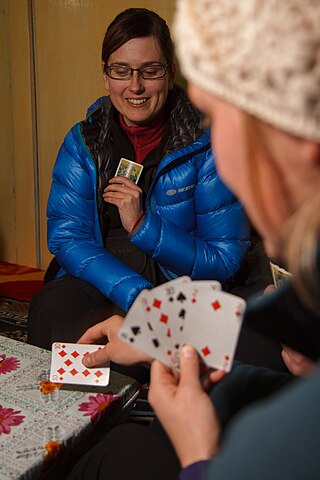
President is a shedding card game for three or more, in which the players race to get rid of all of the cards in their hands in order to become "president" in the following round. It is a Westernized version of Chinese climbing card games such as Zheng Shangyou, and the Japanese Daifugō.

Big two is a card game of Cantonese origin. It is similar to the games of winner, daifugō, president, crazy eights, cheat, and other shedding games. The game is very popular in East Asia and in Southeast Asia, especially throughout mainland China, Hong Kong, Vietnam, Macau, Taiwan, Indonesia, the Philippines, Malaysia and Singapore. It is played both casually and as a gambling game. It is usually played with two to four players, the entire deck being dealt out in either case. The objective of the game is to be the first to play off all of one's cards.

Mau-Mau is a card game for two to five players that is popular in Germany, Austria, South Tyrol, the United States, Brazil, Greece, Czech Republic, Slovakia and the Netherlands. Mau-Mau is a member of the larger Crazy Eights or shedding family, to which the proprietary card game Uno belongs. However, Mau-Mau is played with standard French or German-suited playing cards.

Golf is a card game where players try to earn the lowest number of points over the course of nine deals.
Pedro is an American trick-taking card game of the All Fours family based on Auction Pitch. Its most popular variant is known as Cinch, Double Pedro or High Five which was developed in Denver, Colorado around 1885 and soon regarded as the most important American member of the All Fours family. Although it went out of fashion with the rise of Auction Bridge, it is still widely played on the western coast of the United States and in its southern states, being the dominant game in some locations in Louisiana. Forms of the game have been reported from Nicaragua, the Azores, Niobe NY, Italy and Finland. The game is primarily played by four players in fixed partnerships, but can also be played by 2–6 individual players.
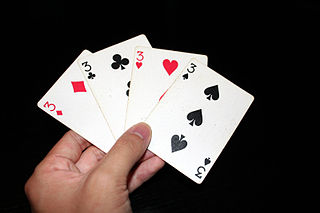
Panguingue, Tagalog Pangginggí, also known as Pan, is a 19th-century gambling card game probably of Philippine origin similar to rummy, first described in America in 1905. It used to be particularly popular in Las Vegas and other casinos in the American southwest. Its popularity has been waning, and it is now only found in a handful of casinos in California, in house games and at online poker sites. In California, it, and the low-ball version of poker, were the only games for which it was legal to play for money.
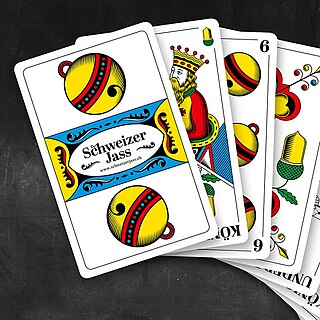
Jass is a family of trick taking, Ace-Ten card games and, in its key forms, a distinctive branch of the Marriage family. It is popular in its native Switzerland as well as the rest of the Alemannic German-speaking area of Europe, Italian South Tyrol and in a few places in Wisconsin and Ohio, USA.

Daifugō or Daihinmin, also known as Tycoon, is a Japanese shedding-type card game for three or more players played with a standard 52-card pack. The objective of the game is to get rid of all the cards one has as fast as possible by playing progressively stronger cards than those of the previous player. The winner is called the daifugō earning various advantages in the next round, and the last person is called the daihinmin. In that following round, winners can exchange their one or more unnecessary cards for advantageous ones that losers have.
Ulti or Ultimó, is Hungary's national trick-taking card game for three players. It is virtually unknown outside its home borders.
Switch, also called Two Four Jacks or Irish Switch, or Last Card in New Zealand, is a shedding-type card game for two or more players that is popular in the United Kingdom, Ireland and as alternative incarnations in other regions. The sole aim of Switch is to discard all of the cards in one's hand; the first player to play her, his, or their final card, and ergo have no cards left, wins the game. Switch is very similar to the games UNO, Flaps and Mau Mau, both belonging to the larger Crazy Eights or Shedding family of card games.
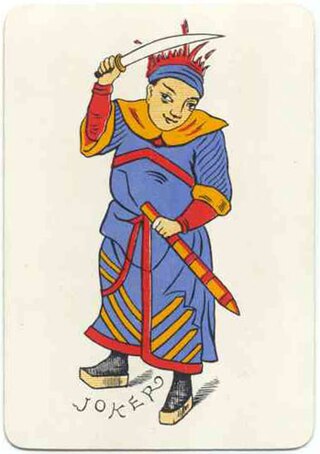
Khanhoo or kanhu is a non-partnership Chinese card game of the draw-and-discard structure. It was first recorded during the late Ming dynasty as a multi-trick taking game, a type of game that may be as old as T'ienkiu, revised in its rules and published in an authorized edition by Emperor Kao Tsung in 1130 AD for the information of his subjects. Meaning "watch the pot", it is very possibly the ancestor of all rummy games.
One-card is a shedding-type card game. The general principles put it into the crazy eights family. It is played with an ordinary poker deck and the objective is for a player to empty their own hand while preventing other players from emptying theirs. The game is commonly played in South Korea, Finland and The Netherlands.
The following is a glossary of poker terms used in the card game of poker. It supplements the glossary of card game terms. Besides the terms listed here, there are thousands of common and uncommon poker slang terms. This is not intended to be a formal dictionary; precise usage details and multiple closely related senses are omitted here in favor of concise treatment of the basics.

Dreierschnapsen, Talonschnapsen or Staperlschnapsen is a three-hand variant of the popular Austrian card game, Bauernschnapsen. The rules are very similar to those for Bauernschnapsen except that, instead of two teams of two players, one player bids to become the soloist against the other two who form a temporary alliance. Another difference is that the game makes use of a talon with which the soloist may exchange cards to improve his hand, hence its alternative name of Talonschnapsen. The game is usually played with William Tell cards.
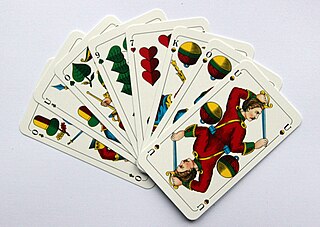
Mucken or Muck is a variation of the popular German card game, Schafkopf. However, unlike Schafkopf, it must always be played in teams of 2 players, so there are no soloist or Rufer ("caller") contracts. Mucken is mainly found in the province of Upper Franconia in the German state of Bavaria. Mucken is often played in Franconian restaurants, as it is part of the Franconian pub culture. The details of the rules vary greatly, even from village to village.
{{Infobox card game | title = German Schafkopf | image_link = File:4queensPRL.png | image_caption = Trumps 3 to 6: the four Queens | alt_names = | type = Point-trick | players = 4 | ages = | num_cards = 16 | deck = French | play = Clockwise | card_rank = Trumps: ♥A ♥10 ♣Q ♠Q ♥Q ♦Q ♣J ♠J ♥J ♦J ♦A ♦10
Side suits : A 10 | origin = Germany | related = German Schafkopf, [[Kop |] | playing_time = | random_chance = | skills = | footnotes = }} Baśka is a fast-moving, Polish card game for four players played using traditional French-suited playing cards. It uses a shortened pack of just 16 cards and is similar to Kop which is also played in Poland. Both are derived from German Schafkopf.













